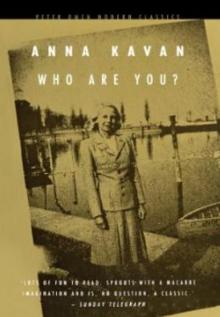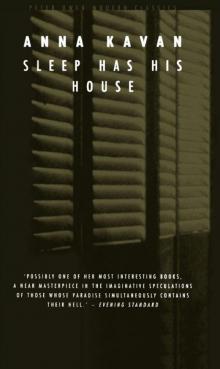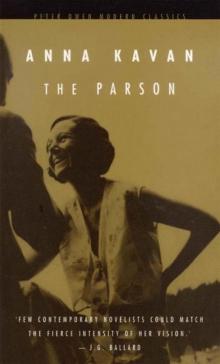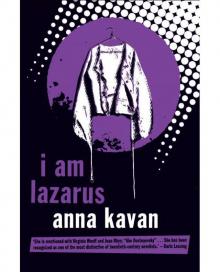- Home
- Anna Kavan
The Parson (Peter Owen Modern Classic)
The Parson (Peter Owen Modern Classic) Read online
PRAISE FOR THE PARSON
‘Written with an imaginative intensity that takes it to the borders of hallucination. A man and a woman, both in thrall to their idea of themselves, play out their drama in a northern landscape like a bad dream. The nearest in our literature to The Parsonis Rhys’s Wide Sargasso Sea, which has something of the myth or ur-tale. This is a fine example of that ancient tale, the predatiory femme fatale and the puritan man.’ – Doris Lessing, Times Literary Supplement Books of the Year 2001
‘A writer of such chillingly matter-of-fact, unself-pitying vigor that her vision transcends itself.’ – New Yorker
‘Kavan fans will revel in the lyrical risk-taking of her prose, the emergence of some of her hallmark images and themes and her brilliant juxtapositions of ancient and modern, rich and poor, good and evil.’ – Publishers Weekly
THE PARSON
The Parson of the title is not a cleric, but an upright young army officer so nick-named for his apparent prudishness. On leave in his native homeland, he meets a rich and beguiling beauty, the woman of his dreams. The days that the Parson spends with Rejane, riding in and exploring the wild moorland have their own enchantment. But Rejane grows restless in this desolate land; doubtless in love with the Parson, she discourages any intimacy. Until that is, she persuades him to take her to a sinister castle situated on a treacherous headland ...
The Parson is less a tale of unrequited love than exploration of divided selves, momentarily locked in an unequal embrace. Passion is revealed as a play of the senses as well as a destructive force. There have been valid comparisons to Poe, Kafka and Thomas Hardy, but the presence of her trademark themes, cleverly juxtaposed and set in her risk-taking prose, mark The Parson as 100% Kavan.
ANNA KAVAN, née Helen Woods, was born in Cannes – probably in 1901; she was evasive about the facts of her life – and spent her childhood in Europe, the USA and Great Britain. Twice married and divorced, she began writing while living with her first husband in Burma and was published under her married name of Helen Ferguson. In the wake of the collapse of her second marriage, she suffered the first of many nervous breakdowns and was confined to a clinic in Switzerland; she emerged from her incarceration with a new name – Anna Kavan, the protagonist of her 1930 novel Let Me Alone – an outwardly different persona and a new literary style.
Her first novel in this guise was Asylum Piece, and it achieved for her a certain recognition. She was a long-term heroin addict and suffered periodic bouts of mental illness, and these facets of her life feature prominently in her novels and short stories. She died in 1968 of heart failure soon after the publication of her most celebrated work, the novel Ice.
ANNA KAVAN
THE PARSON
PETER OWEN
LONDON AND CHICAGO
Publisher’s Note
This is the only remaining novel by Anna Kavan, left among her manuscripts, which has never been published hitherto. A significant feature of the narrative is that it presages, through its undertones and imagery, some of her later and most enduring fiction. Some minor editorial emendations have been made to the final extant draft of the text prior to publication. Otherwise it remains unaltered, as the author wrote it.
It has not been possible to date the book exactly, but it was probably written between the mid-1950s and the early 1960s.
1
ONE afternoon at the end of a wet northern summer, a most improbable meeting took place between two people from worlds which could hardly have been further apart.
One was a young lieutenant, the eldest of six children whose native country this was, and whose father had died long before, leaving the family in poor circumstances. The other, from the south, was like the heroine of a romantic story, beautiful and extremely rich.
Rejane had just left her current lover after a violent quarrel, meaning to stay away for a week or two, until her absence had reduced him to a sufficiently abject state. She was bored with all the usual places her set frequented, and had come to this northern country because she’d never seen it and it was the remotest place she could think of. But it rained the whole time and the hotel was empty. She was already planning to leave after a few days of solitary boredom when Oswald appeared, and she changed her mind.
The tall, athletic young man, whose skin was tanned much darker than his very fair hair, aroused her interest, not by his good looks but because she immediately saw that there was something puzzling about him, something incongruous, that required explanation.
He was unmistakably an army type; even now, in casual civilian clothes, the uniform could be felt in the background. And he had a certain military assurance, sure of himself as an officer and a gentleman, though without a trace of conceit or swagger. This, with his rather severe good looks and superb physique, made him unusually impressive for such a young man.
Yet it seemed to Rejane, unobtrusively watching him across the hotel room, that his assurance was slightly overstated, as if he needed to convince himself; and, suddenly, in one of the flashes of inspired intuition she sometimes had when her interest was aroused, she saw that it was only his position in life he was sure of – not of himself in the middle of it.
Most strange, this was to her, this division, as if he stood outside his own circumstances. Her interest was stimulated still further.
He looked so straightforward and normal, so extroverted. At a first glance, he seemed all simplicity and directness, a man made for action, not thought, engagingly natural and absolutely trustworthy, within his limitations. He should have been perfectly at ease with himself, entirely at home in his world. And, most of the time, he kept the assured army façade. Only at an occasional unguarded moment his face had a bewildered lost look that was touching and most unexpected. In his dark-blue eyes, to which his tropical tan gave a startling brilliance, could be seen the same lost bewilderment, so inappropriate it was almost uncanny, like an improbable secret he carried always upon his person.
Rejane wasn’t touched by it, but she was intrigued. A secret was always a challenge to her, something she had to possess. On the spot, she decided to make this handsome walking secret her property, although it meant staying on here in the wilds, cut off from everything that composed her real existence. Five minutes ago, this small, out-of-the-way country had seemed a terrible bore, she’d wanted to leave by the very next boat. Now at last it had provided her with an interest – even the weather seemed to have turned over a new leaf.
*
The change in the weather was responsible for the whole thing. If this September day hadn’t unexpectedly brought brilliant hot sunshine, she would never have seen Oswald at all. He would never have driven his mother across the moors to the comfortable little modem hotel where she was staying, which, during his absence abroad, had replaced the dilapidated smugglers’ haunt he’d known all his life.
Though any stranger approaching across the moors would have supposed it to be miles inland, the hotel was really right on the edge of one of the countless inlets which turned the map of that coastline into a sort of fringe; deep narrow lochs, everywhere winding into the sombre landscape of moors and great granite tors.
As soon as the mother and son got out of the car, they could feel the pleasant salty astringency that rose from the unseen creek. Steep steps led down to a rough terrace of half-submerged rocks, around which the pellucid water, clear and solid looking as blue-green glass, lazily swelled and sank, to the barely perceptible rhythm of distant waves. While they were standing here, looking over the bright water to the upland slopes on the other side, a sudden chill penetrated the summery afternoon, as if sent to remind them that it wasn’t really summer and that they were in the nort
h, though the sun still shone and there wasn’t a breath of wind.
So they went indoors and ordered tea in the hotel lounge; where they couldn’t fail to be very much aware of the stranger who was its only other occupant, dressed with an elegant simplicity rarely seen in their sparsely populated district.
In the blond north, in that remote and unlikely setting, Rejane’s dark beauty was quite extraordinary, with its sensuous contrast of pale flawless skin and almost black hair and eyes. Her complexion was pure magnolia. And her hair fell in soft, dark waves that always looked perfect and perfectly natural – everything about her had this inevitable sort of perfection, as if it just happened that way. Naturalness was one of her great assets, her beauty being in no way artificial, but the result of supreme good health. Her body was as perfect as Oswald’s, and, though she was a few years his senior, might have belonged to a slim young girl – except that no young girl ever had so much glamour. The impression she liked to give – it was somewhat misleading – was of a charming and lovely girl, quite simple and unassuming, unspoiled by money and adulation.
To Oswald, she was by far the most enchanting person he’d ever seen. An irresistible attraction drew his eyes towards her; and he hardly tried to resist, as if such glamorous beauty must not be kept private but could be admired, like royalty, without rudeness.
His mother, too, though usually timid with strangers, seemed to feel free to observe this one, so different from herself. And, as if the contrast made her half aware of deficiencies in her own appearance, she vaguely pushed a stray wisp of hair under her ancient hat before picking up the teapot, which had been set in front of her. As she began to pour, still under the spell of the unknown beauty, she murmured, ‘Who can she be? What can she be doing here? She doesn’t look at all the sort of person to come to the moors ...’ Then she stopped abruptly, silenced by her son’s disapproving frown.
Though he’d always been deeply devoted to her, at this moment everything about his mother got on his nerves – her dowdiness, her sudden silence and meekness, as much as her muttered personal remarks. At the same time he felt guilty, unfair and unkind, knowing that devotion to her family was responsible for her behaviour – she was shy and awkward for the same reason that she was badly dressed; because the poverty that followed his father’s death had limited her experience of the world, imprisoning her at home, so that she was out of her element in a hotel lounge, almost as if she belonged to a lower class than her handsome, obviously well-bred son.
*
It had been for him, the first bom, rather than for any of his brothers and sisters, that she had saved and slaved, not only to educate him but to add to his share of the meagre patrimony, so that he could enter his father’s regiment, as tradition required. In their small northern country, advanced in some ways, in others behind the times, it was still the age of absolute male supremacy, the divine right of the eldest son hadn’t been questioned. So that Oswald could go into a crack regiment, the education of the younger boys had been skimped; the girls it had not been thought necessary to educate, beyond the rudiments their mother could teach them. This state of affairs Oswald himself found quite natural; but he’d never forgotten his debt, or that it was his duty to do credit to the family, as he always had done, coming back this time more of a credit to them than ever, already promoted, and assured of success in his profession – his superiors said he was sure to get to the top.
With his good looks, good manners and air of breeding, he might meanwhile have been enjoying a great success with the army ladies. But he’d never had any time for the flirtatious creatures who’d done their best to seduce him. Loyalty would have kept him away from them in any case; loyalty to his brother officers, and, still more, to his family, who had made sacrifices for his career – he valued it far too highly to risk a damaging scandal; and, anyhow, he was not attracted.
Because he always treated the women with the same cool politeness, and because he smoked and drank only in moderation and to be like his comrades, they called him The Parson, and the name stuck, being peculiarly appropriate. Even the men under him used it behind his back. In spite of his good fellowship and his natural zest for living, there really was something faintly priestlike about the fine-looking young man, which showed itself in his conscientiousness and integrity and in his dedicated attitude to the regiment. His little air of seriousness was distinctive and rather winning, and acted almost as an aphrodisiac on the spoiled, blase women, bringing them around him like a swarm of bees.
They couldn’t bear his imperviousness to their attractions. Just how impervious he was they never guessed, for he took care to hide the near-disgust they inspired in him physically, over-sexed as he considered them, over-stimulated by the climate and by good living. They couldn’t leave him alone. But the more they pursued, the more distant he became. He really loathed the occasions when he was forced into contact with them. More than any unpleasant duty, he loathed the dances held at regular intervals, which he avoided at first, reading alone in his quarters, while his comrades disported themselves and conducted their more or less discreet intrigues.
The women were, of course, greatly in the minority, even the plainest of them much in demand; but the plethora of young partners didn’t compensate for Oswald; they couldn’t do without him. Finally they got the Colonel to assert his authority, on the grounds that for a junior officer to make himself conspicuous by not dancing showed intolerable conceit, and endangered regimental morale.
Ordered to attend, Oswald did so with the impeccable correctness with which he carried out all his duties, dancing with formal precision with each partner in turn, apportioning his time with scrupulous fairness, so that they all got equal shares. He hated the women now more than ever for forcing him to dance with them; hating above all things to feel, against his hard, fit, muscular body, their soft, yielding semi-nakedness, which always seemed to exude a lustful excitement repugnant to him beyond words. However, he had been given an order, so he had to obey it; always very correct, impersonal, as indifferent to his partner of the moment as if she’d been some piece of military equipment. At first this only inflamed his adorers. Yet, really, it was insulting, the way he let it be seen he hardly knew one of them from another. Circling the room with an expressionless face, holding the woman in his arms well away from him, he seemed to insult the very flesh of his partner. It was his way of getting his own back.
It was not unsuccessful. But he had to pay for it. In the long run it reacted against him. Though the husbands began by sniggering at the discomfiture of the wives they knew were unfaithful, they soon started to resent the implied insult to themselves – these, after all, were the women they’d chosen. And presently, when the women realized that Oswald never would succumb to their seductions, they turned nasty, trying to make trouble for him with their menfolk, creating unpleasant scenes, for which he, of course, got the blame. On the whole, he’d have aroused much less ill-feeling by presenting a new pair of horns all round. What would it have mattered, with the antlers they all wore already?
Since his virtue had made everybody uncomfortable, there was a consequent general withdrawing, a cooling-off towards him, his popularity in the mess suffered a sharp decline, and his nickname, The Parson, came to be used more as a sneer. The really senior officers still thought highly of him; the CO, particularly, valued his dedicated attitude which belonged to a past generation of soldiers, already almost extinct. The older women too remained friends with him, and he with them. There was nothing of the woman-hater in his temperament. On the contrary, it was his idealized notion of womanhood that made the promiscuous sexiness of the young wives so repulsive to him.
For his age, time and position, he was singularly innocent – it was part of his charm – without being in any way prudish, priggish or epicene. His attitude towards sex was rather romantic; he had too much regard for it to degrade it by sordid little affairs and mean escapades. He wasn’t a virgin, but confined his activities to the meek brown wom
en smuggled intermittently into the officers’ quarters. And there was always the sublimation of exercise. Often, at the end of an exacting day, while his companions relaxed over their drinks, he would be out on his sweating polo pony on the parched maidan, practising alone in a cloud of dust, until it got too dark to see the ball.
The army was everything to him, any other sort of existence unthinkable. As long as he’d been accepted in friendliness by his equals, he’d lived untroubled, unthinking, content with his humble but essential place in the structure of the regiment. Only now, in the time of his unpopularity, he began to feel lonely and dissatisfied. He’d given himself absolutely to the discipline of the regiment, and his loyalty couldn’t be shaken. But simply to know he was doing his duty seemed not to be enough. His former thoughtless, almost childish content was no longer possible. He had to think about the way he’d been made to feel isolated, different from his companions; and, as soon as he started thinking, he saw that they’d turned against him unfairly, simply because he’d kept to his principles.
He’d never been lonely before. Good-natured as he was, equable and a natural athlete, popularity had always been his as a matter of course. A slight unconscious sense of inferiority on account of his northern origin had prevented him from making any close friends in the regiment – inevitably he was out of touch with the ideas and opinions the others freely expressed. But, really, he’d felt no need of intimacy, existing always in a group. He’d been satisfied with the rather desultory superficial contact he had with his comrades. Now, suddenly, this was lost to him, he was left stranded.
He assumed indifference and assurance to cover his loneliness. His physical condition was perfect, and nobody must suspect that there was anything wrong with him inwardly. Since he was not introspective, his unsatisfactory state remained for the most part unthought about, undefined. But he knew that all was not well with him. Gradually he developed a nameless sort of yearning, a vague dream of easement, never put into words. And sometimes, listening, under the hot evening sky, to the men singing sentimental songs he had heard at home, he felt restless and sad, stirred by his vague longings.

 Machines in the Head
Machines in the Head Ice
Ice Who Are You?
Who Are You? Let Me Alone
Let Me Alone Sleep Has His House
Sleep Has His House The Parson (Peter Owen Modern Classic)
The Parson (Peter Owen Modern Classic) Guilty: The Lost Classic Novel
Guilty: The Lost Classic Novel I Am Lazarus (Peter Owen Modern Classic)
I Am Lazarus (Peter Owen Modern Classic)